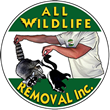With the colder weather right around the corner, urban pests of all shapes and sizes are hurrying to find shelter for the winter months. With unfriendly temperatures as well as a decreasing food supply, all animals will have to adapt and change their behaviors if they hope to survive in a harsher environment. This is especially true for raccoons, the largest animal commonly found in residential areas. Raccoons prepare for winter by adapting their behaviour in several ways.
In order to effectively control the population, it helps to understand how these animals behave.
Do you need wildlife removal services? Request a quote today!
HIBERNATION?
Most people believe raccoons hibernate during winter months. Which is understandable as you rarely if ever see them around the neighborhood once the cold weather sets in. What actually takes  place is they go into a state refered to as torpor. This is a state of diminished activity marked by a deep sleep, a decrease in breathing rate and a complete metabolic slow down.
place is they go into a state refered to as torpor. This is a state of diminished activity marked by a deep sleep, a decrease in breathing rate and a complete metabolic slow down.
This process is aided by the thick winter coats raccoons instinctively develop before the winter. This allows them to conserve their energy stores and stay warm more efficiently during the torpor process.
Some biologists refer to this process as being a mild form of hibernation. However, unlike other animals who hibernate for the winter, raccoons may wake up during warm spells and be seen in and around our neighborhoods.
Either way, raccoons go through a period of reduced activity, similar to hibernation in order to adapt to a harsher climate and reduced food sources.
DEN SITES
Regardless of whether its an early or late fall, as soon as the thermometer dips below the comfortable temperature range for raccoons; they will aggressively seek out a place to make their den for the winter. In populated and residential areas, this more often than not ends up being in your attic, garage or sheds.
The onset of colder weather also coincides with their mating season. This is one of the main reasons you want to be vigilant and have them evicted as soon as they attempt to move in. The removal and prevention process becomes exponentially more difficult once babies are thrown into the mix. Often times the solution requires the homeowners to wait until the babies are mobile, which takes several weeks.
It’s best to act quickly if suspect you have raccoons taking up residence in your home. The longer you wait, the more expensive it will be.
SCARCE FOOD
In the weeks and months leading up to winter, a raccoons body will undergo several significant changes. These take place in order to help the raccoon survive the harsh and cold climate it will soon encounter.
The most important thing that happens during this period is they increase their food intake. This allows them to increase and store body fat, which in turn will help sustain them during the winter months.
Because they eat such a varied diet (pretty much anything in our garbage bins) they have a biological advantage over other urban pests. Because of the diversity they enjoy, they are less affected by scarcity.
The other significant advantage they have is unlike animals who hibernate, raccoons will come out during warmer spells and eat whatever is available. Raccoons are prepared for winter in large part due to this abiltiy to eat a wider variety of foods .
RACCOON PREVENTION
There are several “common sense” actions you can take to decrease the risk of raccoons targeting your residence (or garbage cans). First off, keep lids secured and when possible employ animal proof systems. Keep areas around your house clear of debris and areas where animals can hide or build a den. Secure any obvious entry points raccoons could use to enter any structures.
These measures of course will help however, once raccoons have decided they want to invade your home and have broken in, its time to call the professionals. You do not want to try your hand at amateur wildlife removal when dealing with an animal of this size and dexterity. Raccoon removal should only be completed by trained professionals.
All wildlife Remova Inc is your local wildlife removal leaders. With decades of in-house experience and several locations in Southern Ontario for your convenience, contact the best today.
Do you need wildlife removal services? Request a quote today!
